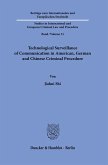Organisierte Kriminalität und Terrorismus sind gemeinsame Probleme ohne gemeinsame Definition. Die Internationalisierung der beiden Probleme und ihrer hybriden Formen betrifft Deutschland ebenso wie China. Dennoch fehlen oft die Voraussetzungen für eine gemeinsame Antwort im materiellen Strafrecht und im Strafprozessrecht. Auch die verfassungsrechtlichen und politischen Vorgaben differieren stark. Der Versuch, trotz all dieser Diskrepanzen Möglichkeiten und Ansätze für einstimmige Problemlösungen zu finden, ist daher so schwer wie wichtig. Die Autorinnen und Autoren lassen den Leser an ihren Analysen und ihrer Kritik an bestehenden Strukturen teilhaben, sodass Unterschiede ebenso deutlich werden, wie die sich trotzdem bietenden konkreten Möglichkeiten der notwendigen Zusammenarbeit. Dieser Band erarbeitet somit Grundlagen für das Verständnis der jeweils anderen Seite.
Organized crime, terrorism and hybrid forms of both are internationalized problems, affectingGermany as much as China. It is important to find solutions working for both sides without compromising social and political values. Since both countries differ in their normative preconditions and institutional setup, such a common response is difficult to reach. Differences in material criminal law as well as in criminal procedure law are obvious. Further frictions arise from constitutional and institutional aspects. Still, the authors engage in a common analysis of related phenomena and do not refrain from criticizing deficiencies in existing normative and institutional structures. This enables the reader to realize differences and to learn about possibilities for common action.
Hinweis: Dieser Artikel kann nur an eine deutsche Lieferadresse ausgeliefert werden.
Organized crime, terrorism and hybrid forms of both are internationalized problems, affectingGermany as much as China. It is important to find solutions working for both sides without compromising social and political values. Since both countries differ in their normative preconditions and institutional setup, such a common response is difficult to reach. Differences in material criminal law as well as in criminal procedure law are obvious. Further frictions arise from constitutional and institutional aspects. Still, the authors engage in a common analysis of related phenomena and do not refrain from criticizing deficiencies in existing normative and institutional structures. This enables the reader to realize differences and to learn about possibilities for common action.
Hinweis: Dieser Artikel kann nur an eine deutsche Lieferadresse ausgeliefert werden.








